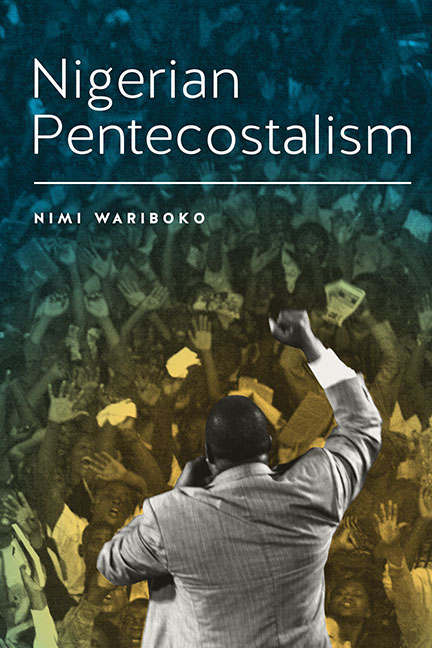Book contents
- Frontmatter
- Dedication
- Contents
- Foreword
- Preface
- Acknowledgments
- Introduction
- Part 1 Origins and Spirituality of Nigerian Pentecostalism
- 1 Sources of Nigerian Pentecostalism
- 2 The Spell of the Invisible
- 3 Excremental Visions in Postcolonial Pentecostalism
- 4 Desire and Disgust: Ways of Being for God
- 5 The Pentecostal Self: From Body to Body Politic
- Part 2 Ethical Vision of Nigerian Pentecostal Spirituality
- Notes
- Bibliography
- Index
3 - Excremental Visions in Postcolonial Pentecostalism
from Part 1 - Origins and Spirituality of Nigerian Pentecostalism
Published online by Cambridge University Press: 15 March 2018
- Frontmatter
- Dedication
- Contents
- Foreword
- Preface
- Acknowledgments
- Introduction
- Part 1 Origins and Spirituality of Nigerian Pentecostalism
- 1 Sources of Nigerian Pentecostalism
- 2 The Spell of the Invisible
- 3 Excremental Visions in Postcolonial Pentecostalism
- 4 Desire and Disgust: Ways of Being for God
- 5 The Pentecostal Self: From Body to Body Politic
- Part 2 Ethical Vision of Nigerian Pentecostal Spirituality
- Notes
- Bibliography
- Index
Summary
The secret things belong to the Lord our God, but those things which are revealed belong to us and to our children forever.
—Deuteronomy 29:29Introduction
This chapter proposes a reading of Pentecostal spirituality in the Nigerian postcolony in the light of the “excremental” vision of religious leaders. The vision reflects the struggles between the flesh and the spirit, desires and the tensions of their impossible fulfillment, and the religious leaders’ critical consciousness of the ambiguity, incompatibilities, and distortions that characterize Pentecostal spirituality under pressures from materialism and saintliness. The discussions and analyses that follow address the question of spirituality in relation to the problem of waste, excess, and superfluity, examining the implications for subjectivity. This relation between subjectivity and waste, excess, or excrementalism highlights the discontinuity and fragmentation that lie beneath every construct of subjectivity. It is this very relationship of breaks that sustains the expectation that history or becoming has not been foreclosed forever for the subject.
Bringing up the topic of excremental visions may jar upon the nerves of many a delicate theologians and Pentecostals. But the figure of waste, excess, or expulsed offcut of biological processes is important for understanding Pentecostal subjectivity in Nigeria, a postcolony. The metaphor of excrement or excess is a common, governing trope for decoding or characterizing the African postcolony for well over fifty years. African postcolonial political leaders conspicuously consume and waste the resources of their nations with a remarkable indifference to proprietary care, utility, and necessity. Novelists and literary critics have deployed the concept of waste to illuminate Africa's social conditions in the postindependence era. “What the excremental texture of postcolonial African literature signals is … the fundamental immorality of luxury and extravagance in a context of scarcity, and its consequent incompatibility with the ideals of postcolonialism and democracy, whose rhetorical deployment serves to legitimate the political and social hegemony enjoyed by the national elites.” Pentecostal theology or philosophy will do well to also investigate the scatological insofar as it sheds light on spirituality in a postcolony. Nigerian Pentecostalism is, as I show, struggling with incompatibilities. The ideals of its spirituality have moved too far away from actual practices; and what is left of them principally serves as rhetorical devices to legitimate political hegemony, clerical indulgence, and antidemocratic governance structure enjoyed by the ecclesiastical elites.
- Type
- Chapter
- Information
- Nigerian Pentecostalism , pp. 54 - 87Publisher: Boydell & BrewerPrint publication year: 2014



